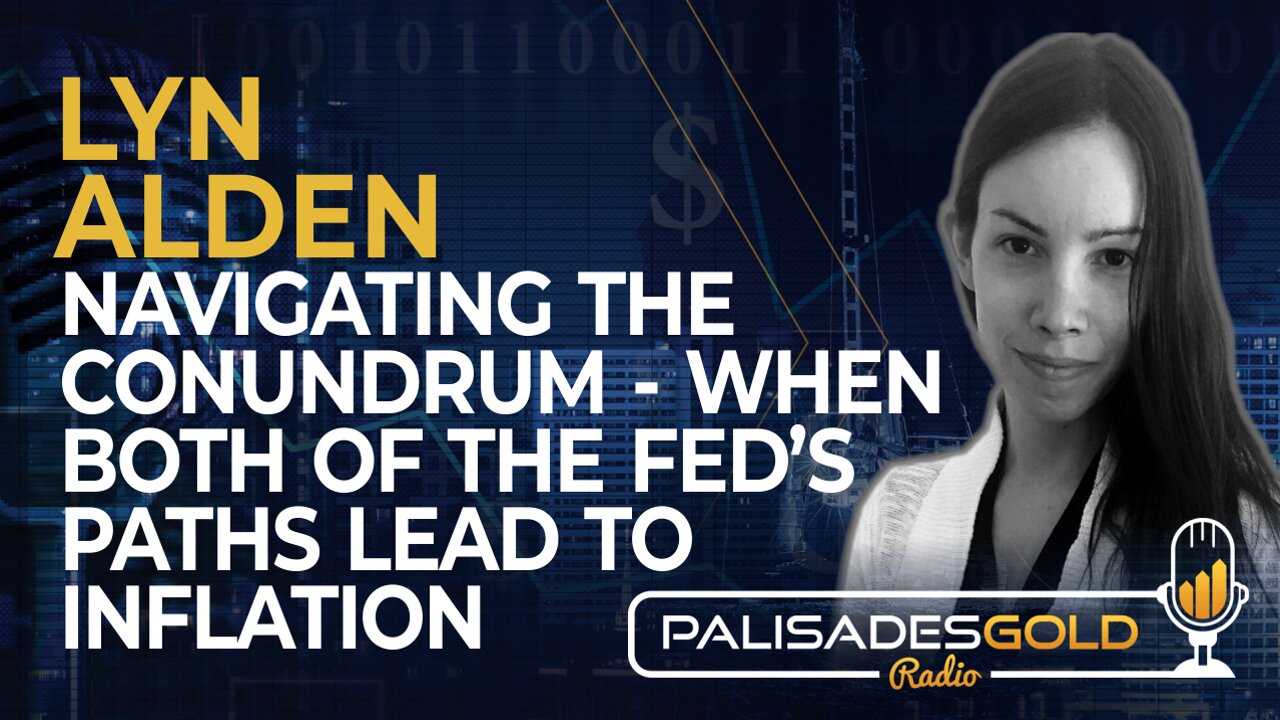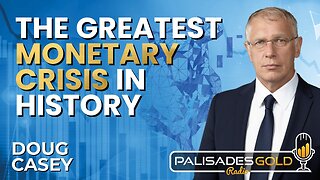Premium Only Content

Lyn Alden: Navigating the Conundrum - When Both of the Fed's Paths Lead to Inflation
Tom welcomes back Lyn Alden, Founder of Lyn Alden Investment Strategy, to the show.
Lyn discusses abundant and scarce things in investing, focusing on the era of fiscal dominance that has led to bonds becoming abundant. This is due to large budget deficits and private debt being transferred to the public sector. The implications include higher average fiscal-driven inflation and potential impact on asset prices and tax receipts.
The Federal Reserve's ability to perfectly tune the economy to avoid recession for the next decade is questioned. In emerging markets, stocks may rise in local currency but decrease in hard money terms during recessions. The U.S., however, is experiencing fiscal dominance where public debt exceeds GDP, making it harder to fight inflation and slow down borrowing. While interest rates can help make a country's currency attractive or reduce borrowing demand, raising interest rates results in ballooning expenses, offsetting disinflationary forces. The commercial real estate sector is heavily impacted, but travel companies, seniors, and wealthy individuals may benefit from higher interest rates.
Lyn discusses the SVB bank crisis in 2023, suggesting that the Fed might prioritize saving banks or the Treasury market over controlling inflation, limiting monetary policy flexibility. The potential outcomes of interest rate cuts include growth and demand for commodities but less effectiveness due to fiscal dominance. She emphasizes energy exposure as a hedge against inflationary pressures.
Investment strategies include owning assets related to dense forms of energy in the energy sector, focusing on demographics, aging workforces, and understanding China's labor supply and demand. Alternative investment portfolios like the permanent portfolio and IV portfolio deviate from the traditional 60-40 stock-bond split by including gold and commodities for diversification.
The development of Bitcoin ETFs is seen as inevitable due to its size and liquidity, but risks include hacks and confiscations. Developed countries generally accept Bitcoin as a store of value while regulating its use as a medium of exchange. The importance of building tools to make Bitcoin more efficient for users is emphasized.
Lyn's book, "Broken Money," discusses global financial system issues, with countries relying on the US dollar facing negative consequences if it devalues or if the US manipulates currencies. Running large structural trade deficits is necessary but comes with negative effects such as decreased export competitiveness and de-industrialization. The shift towards more neutral assets like gold and Bitcoin in response to unreliable US dollars is emphasized, along with considering multiple variables and being data-dependent.
Time Stamp References:
0:00 - Introduction
0:33 - Bonds, Rates, & Inflation
8:42 - Fed and Recessions
13:30 - Fiscal Dominance & Stability
19:28 - Contrasting the 1940s
23:06 - Feds Blinks at Bank Crisis
25:54 - Deficits & Debt Rollover
29:54 - Rate Cuts & Outcomes
31:52 - Easing and Hard Assets
33:14 - Energy Exposure?
37:40 - Demographics & Demand
41:26 - China & Manufacturing
44:42 - Labor & Underinvestment
47:20 - Skills & Semiconductors
50:00 - Portfolio & Reallocating
53:20 - Bitcoin ETFs & Impacts?
56:06 - Capital Controls & Walls
59:23 - Dollar & Broken Money
1:03:57 - Wrap Up
Talking Points From This Episode
- Fiscal dominance, inflation, and why the Fed is cornered.
- Understanding multiple forces in macroeconomics and the Fed being data-dependent.
- A Shift to Neutral Assets in a World of Fiscal Dominance and Unreliable Currencies
Guest Links:
Twitter: https://twitter.com/LynAldenContact
Website: https://www.lynalden.com/
Lyn Alden is editor and publisher of LynAlden.com, where she has both a subscription and a free financial newsletter. She says, "Her background lies at the intersection of engineering and finance." Her site provides investment research and strategy, covering stocks, precious metals, international equities, and alternative investments, with a specialization in asset allocation. Whether you're new to investing or experienced, there's a lot there for you.
Lyn has a bachelor's degree in electrical engineering and a master's degree in engineering management, focusing on engineering economics and financial modeling. She oversees the finances and day-to-day operations of an engineering facility.
She has been performing investment research for over fifteen years in various public and private capacities. Her work has been editorially featured or cited on Business Insider, Marketwatch, Time's Money Magazine, The Daily Telegraph, The Philadelphia Inquirer, The Street, CNBC, US News and World Report, Kiplinger, and The Huffington Post. She has also appeared on Real Vision, The Investor's Podcast Network, The Rebel Capitalist Show, The Market Huddle, and many other podcasts. She is also a regular contributor to Seeking Alpha, FEDweek, and Elliot Wave Trader.
-
 56:43
56:43
Palisades Gold Radio
13 days agoDoug Casey: How To Profit from a Monetary Reset | Gold, Silver, Miners and Oil & Gas
6632 -
 3:29:04
3:29:04
TimcastIRL
5 hours agoTrump Calls For DEATH Of Democrats For Sedition, White House WALKS IT BACK | Timcast IRL
221K104 -
 24:13
24:13
Jasmin Laine
9 hours agoPoilievre Can’t Stop LAUGHING—Liberals IMPLODE After U.S. Ambassador Calls Them Out
16.6K20 -
 4:04:31
4:04:31
SpartakusLIVE
7 hours agoTexas FARMBOY turned WZ PRO turned REDSEC HERO turned ARC LOOT GOBLIN
41.5K -
 2:34:18
2:34:18
Mally_Mouse
5 days ago🎮 Throwback Thursday! Let's Play: Kingdom Hearts 1 pt. 4
33.9K5 -
 25:14
25:14
Stephen Gardner
5 hours agoCLINTONS PANIC AS ARREST CALLS EXPLODE – Scott Jennings GOES OFF! 😱
30.8K25 -
 2:14:15
2:14:15
DLDAfterDark
3 hours ago $1.18 earnedThe AR15 BurnDown That Will Leave You Speechless!
19.4K1 -
 1:48:12
1:48:12
megimu32
4 hours agoON THE SUBJECT: Throwback Thursday | Wheel of Nostalgia Chaos!
27.1K9 -
 2:32:11
2:32:11
Flyover Conservatives
23 hours agoTrojan Horse in the Big Apple? Prophetic Warning w/ Robin D. Bullock | FOC Show
32.6K9 -
 1:31:48
1:31:48
Precision Rifle Network
1 day agoS5E6 Guns & Grub - The Boys Are Back!
15.5K8